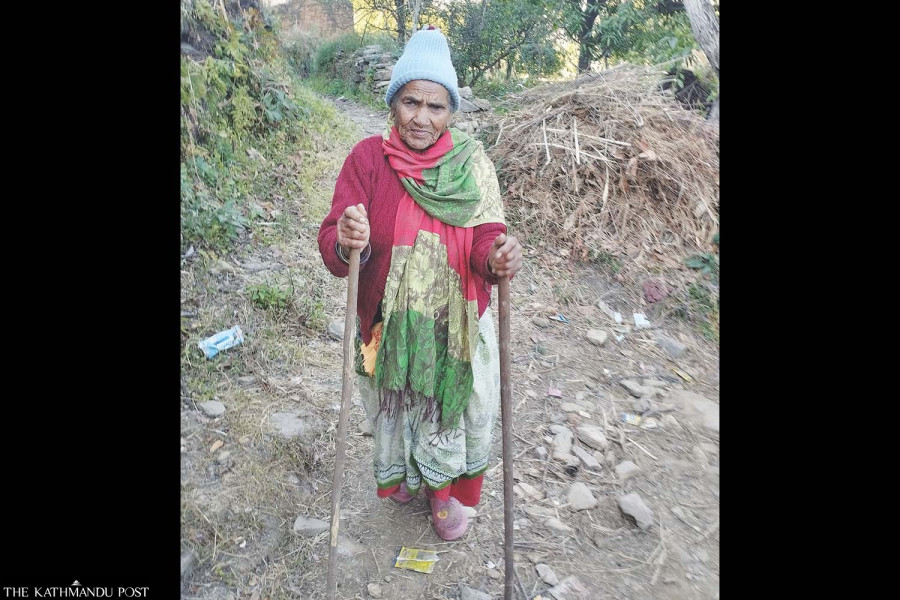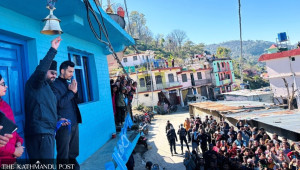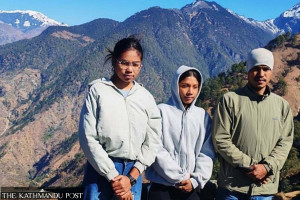Sudurpaschim Province
Elderly seek easy access to allowance cash
Most banks are located at town centres and those from outlying areas have to travel long distances to collect the money.
DR Pant
Dhauli Devi Luhar, a 73-year-old woman from Dewal in Ajayameru Rural Municipality-5, lost her husband 16 years ago. Six months ago, her son, who had gone to Qatar for work, died there, leaving behind a wife and a son.
Now the responsibility of looking after her daughter-in-law and grandson has fallen on Luhar’s shoulders. She says her only source of income is the elderly allowance she gets from the government, adding she collects Rs12,000 every three months at the rate of Rs4,000 per month.
“With that money, I pay the loan that we took from the cooperative to send my son for foreign employment, buy rice and lentils, and pay for the education of my fourth-grader grandson,” Luhar said. “The elderly allowance given by the government is the only support we have.”
But it takes a lot of hard work to collect that money, Luhar says. “I have to walk for more than five hours to go to the bank to collect it,” she said. “There is no transportation service in this area.”
Kali Saud, a 70-year-old woman of Rupal in Bhageshwar Rural Municipality-2, and her 90-year-old husband are also completely dependent on the elderly allowance after their only son, who went to India for employment 12 years ago, went missing.
“My three daughters are married and have moved away. My only son disappeared in India. The elderly allowance comes as a boon for us,” Saud said. “We don’t have to ask for help from anyone but it’s getting difficult for both of us to go to the ward office in Bagarkot to collect the amount every three months.”
Bagarkot is 24 km from her house. Due to geographical difficulties and a lack of transportation services, it takes her two days to reach there. An asthma patient, Saud says it is getting difficult for her to make the journey.
The elderly from various local units in Dadeldhura are facing similar problems and have requested the local units several times to make arrangements for them to be able to collect their allowances with ease. But the local authorities haven’t responded to their requests, Saud said.
The federal government under its welfare scheme provides Rs12,000 quarterly to each senior citizen above 68 years as social security allowance through the local units. But most of the beneficiaries have to be physically present to receive their allowance at the designated banks.
According to Saud, she walks four hours up a steep road from her house to the bus stand, where she spends the night waiting for the early morning bus. The next day, she reaches Sanima Bank, from where she collects her allowance, in Bagarkot. “I stand in line for hours at the bank and I return the same day after collecting our allowance,” she said. “My husband can’t make the journey so I receive his allowance as well.”
Several people from the underserved category of the population—elderly, Dalits, single women, landless, and disabled, among others—rely heavily on social security benefits. But for the elderly, the absence of an easier system of receiving their allowance has brought about many challenges.
“There is no doubt that the lives of people like us have become easier because of the allowance,” said Lal Bahadur Saud, a 76-year-old man from Rupal. “But the hardships we endure in this old age to receive the allowance take a toll on us, physically and mentally.”
Most banks are located in the administrative centre of the local units and those from the far-flung villages have to travel long distances to reach the banks.
“Most of us don’t have anyone to help us travel,” said Lal Bahadur. “In the hilly districts, people have to walk two to three days just to reach the bank. Then they have to stand in line for hours awaiting their turn. Those in poor health conditions suffer the most.”
According to Lal Bahadur, every election, people’s representatives promise them solutions to their difficulties with some even promising door-to-door service but so far none has kept their promises.
Basant Chataut, chairman of Bhageshwor Rural Municipality-4 whose campaign promise was to deliver the allowances at people’s doorsteps. “Every beneficiary in the hilly and mountainous regions has been facing this issue,” he said. “There have been a lot of discussions but we are yet to find a way to start a door-to-door banking service.”
Chataut added that the banks do not have the manpower to start the service. “Then there are legal hurdles and bank’s rules and policies that deter us from reaching people’s homes with services,” he said.




 10.12°C Kathmandu
10.12°C Kathmandu















